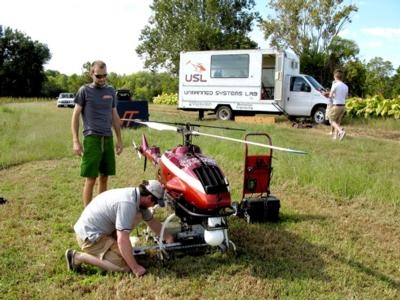Virginia FACT Funds To Be Disbursed Over The Next Three Years
The Commonwealth of Virginia announced it will award more than $2.6 million over three years in Federal Action Contingency Trust (FACT) funds to Virginia Tech to operate an unmanned aircraft systems test site in the state, officials from the governor’s office said Monday. The grants will provide Virginia Tech with $1 million in fiscal year 2014, an additional $1.2 million in fiscal 2015, and $437,000 in fiscal 2016.

The test range is operated by the Mid-Atlantic Aviation Partnership, which is led by Virginia Tech and Rutgers University and represents an effort to safely develop unmanned aircraft systems. The University of Maryland has also agreed to partner with Virginia Tech and Rutgers on unmanned aircraft system integration.
“Virginia Tech is honored to be leading this effort for the Commonwealth of Virginia and extremely gratified by the commonwealth’s support,” said Virginia Tech President Charles W. Steger. “We are convinced that Virginia, teamed with New Jersey and Maryland, is poised to make the mid-Atlantic region the leader in unmanned aircraft system research, development, testing and evaluation, and manufacturing. I’m proud of our faculty with the Virginia Center for Autonomous Systems and Institute for Critical Technology and Applied Science for providing vital expertise in autonomous systems to this effort.”
The funds will take the Mid-Atlantic Aviation Partnership from its current “volunteer” status to a fully functional and revenue-producing organization, capable of competitively analyzing and testing unmanned aircraft systems for industry and government. The partnership intends to start charging clients for flight operations by March 2014, with the goal of becoming a self-supporting operation that will positively affect Virginia’s economy and budget.
Partnership leaders say integrating unmanned aircraft systems into the national airspace is expected to bring between 180 and 860 additional jobs to the commonwealth, create between $45 million and $164 million in additional economic activity, and result in between $1 million to $2 million in additional state and local tax revenue per year by 2023.
The FACT fund was created by the Virginia General Assembly in 2012 to prepare the state for mandatory federal spending cuts. Many of the partnership team members are concentrated in areas that were stunned by mandatory federal budget cuts to the Department of Defense. The partnership also helps answer the Federal Aviation Administration Modernization and Reform Act of 2012, which calls for the establishment of six unmanned aircraft system test sites. The sites are expected to be named this year.
“While being named a Federal Aviation Administration test site would provide a significant competitive advantage to the partnership, even without that designation, the team intends to remain intact to conduct unmanned aircraft systems research, development, and test and evaluation activities,” said Jon Greene, interim executive director of the Mid-Atlantic Aviation Partnership and an associate director at Virginia Tech’s Institute for Critical Technology and Applied Science. “The partnership has already conducted test flights.”
(Pictured: Anthony Distefano, a technician with American Aerospace Advisors Inc., makes adjustments to the payload of a 250-pound, autonomous helicopter for the first flight under the auspices of the Mid-Atlantic Aviation Partnership. Mechanical engineering student Kenneth Kroeger was among about a half-dozen Virginia Tech students on the flight crew. Image provided by Virginia Tech)
 NTSB Final Report: Cessna 177B
NTSB Final Report: Cessna 177B ANN's Daily Aero-Term (05.08.25): Final Approach Fix
ANN's Daily Aero-Term (05.08.25): Final Approach Fix Aero-News: Quote of the Day (05.08.25)
Aero-News: Quote of the Day (05.08.25) ANN's Daily Aero-Term (05.09.25): Estimated (EST)
ANN's Daily Aero-Term (05.09.25): Estimated (EST) ANN's Daily Aero-Linx (05.09.25)
ANN's Daily Aero-Linx (05.09.25)



